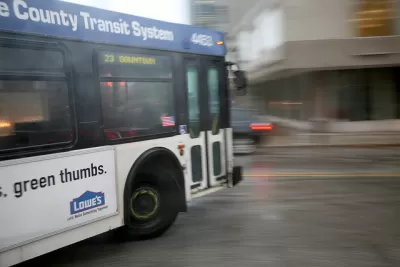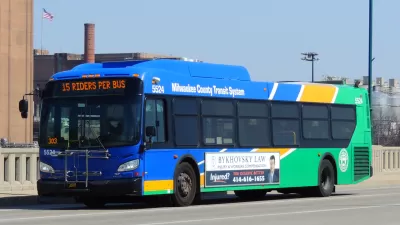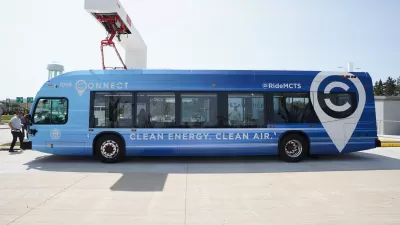Funding for two routes is running out soon, but many workers depend on this service to access jobs outside of the city.

Bruce Murphy writes about the latest on two Milwaukee bus lines, known as the “Job Lines," that connect workers in the city to jobs in outlying suburbs and exurbs. The routes were created in 2014 with the $13.5 million settlement of a lawsuit alleging that planning for the Zoo Interchange expressway did not consider the travel needs of residents from Milwaukee’s low-income and minority communities.
“But the money would cover just four years and is running out at the end of December. So those two bus lines, Route 6 and Route 61, are about to be discontinued. And now no one seems to have a solution to the issue,” says Murphy.
The UW-Milwaukee Center for Economic Development has released a new study showing that the majority of riders on these routes are African American and from the lowest-income parts of the city. Most are also transit-dependent riders traveling to jobs along the routes.
Still, Milwaukee County Transit System officials say that the routes are not cost effective enough to continue and that Route 61 can be replaced with an extension of another line. Murphy also notes that Route 61 extends into two adjacent counties that do not help fund the line, and the three counties have not worked together to try to keep it running.
Murphy also says that companies on along those routes need workers, but they are unlikely to advocate for the bus lines or work to provide private transportation to their employees. “At a time of very low unemployment, the biggest losers may actually be the employers. But long-term the separation between workers and companies in the metro area will continue to retard economic development and stall progress in the Milwaukee region,” says Murphy.
FULL STORY: Black Workers Losing Transit to Jobs?

Planetizen Federal Action Tracker
A weekly monitor of how Trump’s orders and actions are impacting planners and planning in America.

San Francisco's School District Spent $105M To Build Affordable Housing for Teachers — And That's Just the Beginning
SFUSD joins a growing list of school districts using their land holdings to address housing affordability challenges faced by their own employees.

The Tiny, Adorable $7,000 Car Turning Japan Onto EVs
The single seat Mibot charges from a regular plug as quickly as an iPad, and is about half the price of an average EV.

Seattle's Plan for Adopting Driverless Cars
Equity, safety, accessibility and affordability are front of mind as the city prepares for robotaxis and other autonomous vehicles.

As Trump Phases Out FEMA, Is It Time to Flee the Floodplains?
With less federal funding available for disaster relief efforts, the need to relocate at-risk communities is more urgent than ever.

With Protected Lanes, 460% More People Commute by Bike
For those needing more ammo, more data proving what we already knew is here.
Urban Design for Planners 1: Software Tools
This six-course series explores essential urban design concepts using open source software and equips planners with the tools they need to participate fully in the urban design process.
Planning for Universal Design
Learn the tools for implementing Universal Design in planning regulations.
Smith Gee Studio
City of Charlotte
City of Camden Redevelopment Agency
City of Astoria
Transportation Research & Education Center (TREC) at Portland State University
US High Speed Rail Association
City of Camden Redevelopment Agency
Municipality of Princeton (NJ)





























